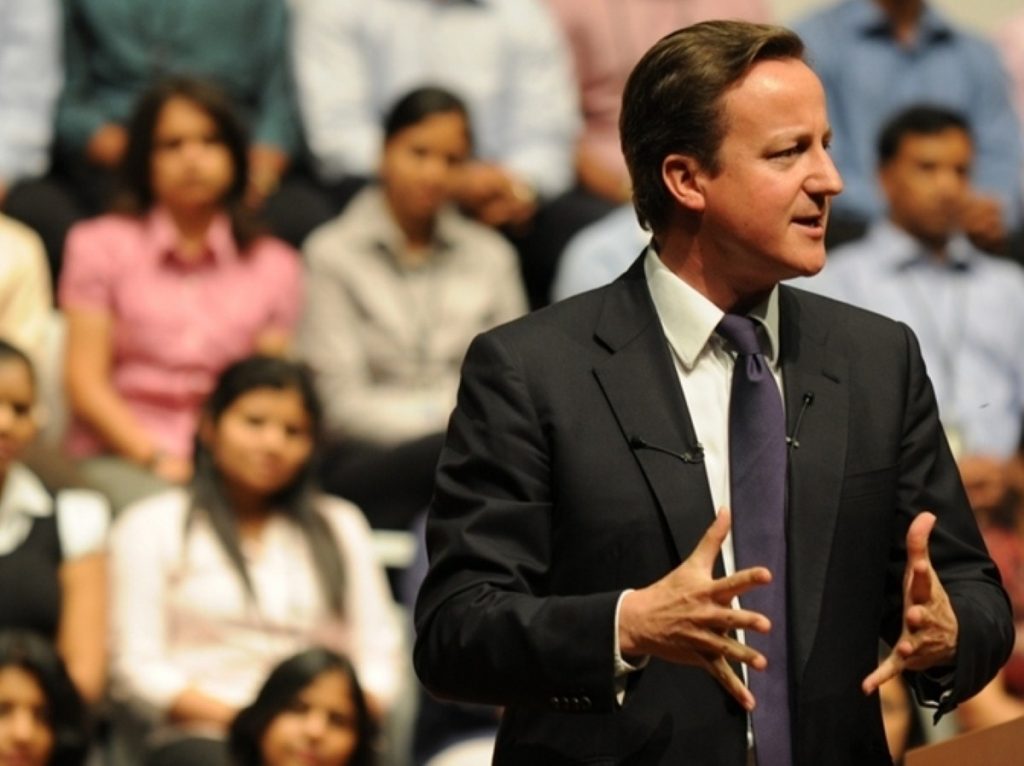Cameron placates Tory backbenchers with rightward drift
By Ian Dunt Follow @IanDunt and Alex Stevenson Follow @alex__stevenson
David Cameron has attempted to placate his backbenchers ahead of a week dominated by Lords reform, with a speech suggesting the party will go to the 2015 general election with a more right-wing agenda.
The prime minister used his speech to propose cutting off housing benefits for under-25s and ending the "culture of entitlement" – strongly alluding to further benefits reform even after Iain Duncan Smith's unprecedented changes to the system this parliament.
"We have created a welfare gap in this country – between those living long-term in the welfare system and those outside it," he said.


"This has sent out some incredibly damaging signals – that it pays not to work, that you are owed something for nothing."
The prime minister argued that while many working young people are forced to live with their parents during their 20s, people on benefits are often able to secure a council flat.
"There are many who will have a parental home and somewhere to stay – they just want more independence," he said.
"The point is this: the system we inherited encourages them to grab that independence, rather than earn it. So we have to ask: up to what age should we expect people to be living at home?"
Mr Cameron is also considering "time-limiting" jobseeker's allowance, restricting child benefit to three children and introducing regional benefit rates to reflect different wage levels across the country.
His speech focused on reforming working-age benefits rather than those for the elderly.
"I want to be very clear: two years ago I made a promise to the elderly of this country and I am keeping it," Mr Cameron added.
"I was elected on a mandate to protect those benefits – so that is what we have done."
His speech raised question-marks over the value of the Conservatives' promise to protect benefits for the elderly, however.
The 2010 election manifesto promise only applies for the duration of the current parliament, until 2015, but Mr Cameron's speech addressed changes going beyond that period.
Tory and Liberal Democrat ministers will be forced to address the issue in the next comprehensive spending review, which will take place before the current spending period ends in 2014/15.
It is possible that the coalition could agree to cut the welfare bill, currently totalling £84 billion a year, without specifying how it would achieve this goal.
"Different political parties will have different policies ahead of the next general election," the prime minister's spokesman added.
Mr Cameron's speech is a strange but telling move from the prime minister. It could constitute a new record for early electioneering, given that most of the recommendations are intended for a Tory victory after the general election.
But with House of Lords reform threatening to trigger substantial Tory rebellions and concerns on the government benches about his failures of presentations since the Budget, Mr Cameron will have felt he needed to offer some assurances to his MPs.
Analysis: Cameron's welfare crackdown is beginning of the end for the coalition
No 10 pointed out that chancellor George Osborne had warned in this year's Budget that, even if departmental spending cuts continue throughout the next parliament, savings of £10 billion will have to be found from the welfare bill.
"We need to be aware that is the implication and we need to look at how we are going to be able to make that saving," the prime minister's spokesperson said.
"The purpose of the speech is to start a debate."
Benefit reform is one of the coalition's most popular policies, with most polls showing that even a majority of Labour voters believe the current system is too generous.
Proposals to limit housing benefit this parliament have caused outrage in parliament, with Labour and some Liberal Democrats warning of social cleansing if lower-income families are driven from wealthy areas, but they remain popular with the public.
The revival of the benefits debate also presents a headache for Labour, which struggles to get on the right side of the public mood on the issue and has its own internal divisions over the current system.
Shadow work and pensions secretary Liam Byrne has previously voiced a sceptical view of Britain's welfare state. Today he challenged the government's record on benefits, but not its aims.
"David Cameron has put worklessness to a record high and he's inviting us to believe that it's the fault of everyone except him," he said.
"It's now very clear that a welfare revolution was all talk. Out of work benefits are going through the roof. Each week we hear of another new initiative, another crackdown, another test.
"Welfare spending is going up under this government because too many people are out of work."
A recent study by the Building and Social Housing Foundation found 93% of new housing benefit claims made in 2010/11 were from households with at least one employed person, but most of the debate around benefits continues to highlight the divide between employed families and welfare claimants.









